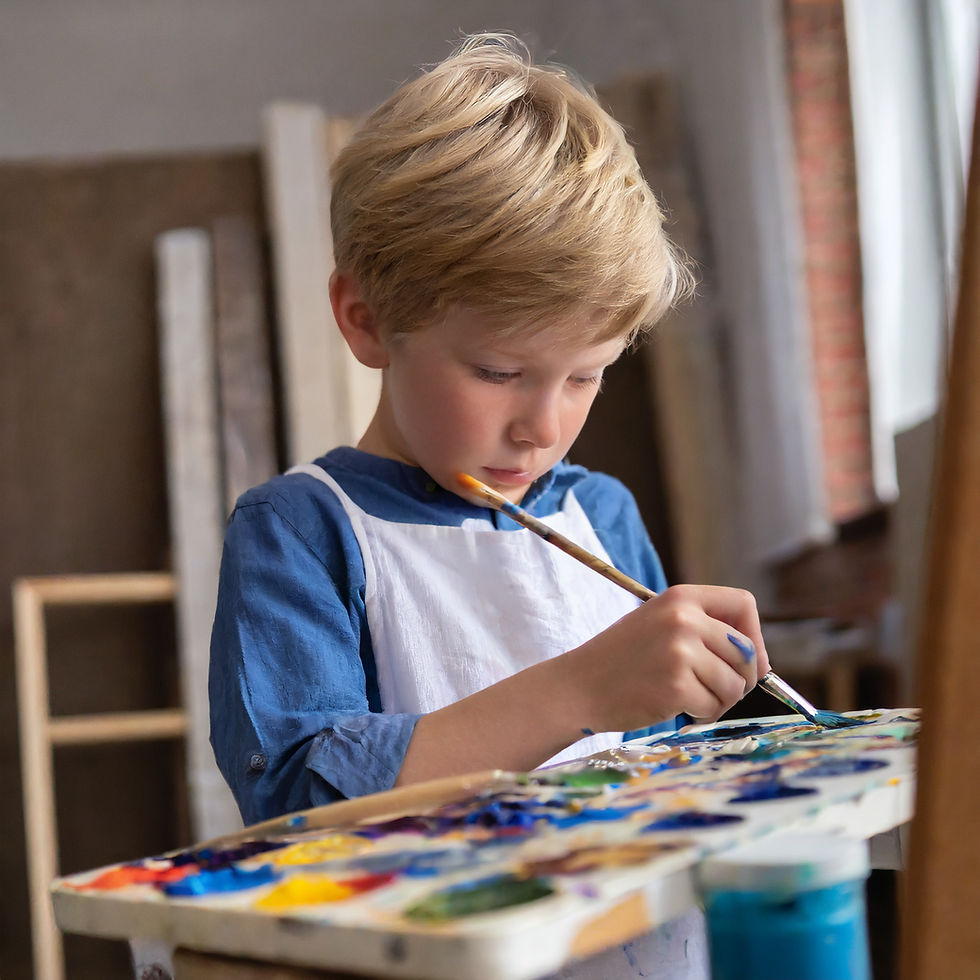Nurturing Creative Thinkers: The Role of Art in Building Skills for Lifelong Learning
- Mallory Shotwell
- Sep 2, 2024
- 3 min read

At Cultivate, our Elementary Art Program is more than just a place to learn how to draw or paint; it’s an environment where children develop foundational skills that extend beyond the canvas and into their everyday lives. Our structured progression from Level A (Beginner) to Level C (Advanced) is designed to nurture not only artistic skills but also critical thinking, creative inquiry, and a lifelong love of learning. This approach helps children grow as artists, thinkers, and members of a creative community.
Lifelong Learning Through Art
Art education plays a crucial role in fostering a lifelong love of learning. By engaging in our progressive curriculum, students learn to approach each project with curiosity and an open mind, whether they are exploring basic concepts in Level A or tackling more advanced challenges in Level C. Research has shown that arts education encourages a growth mindset, where children learn to value effort over innate talent and see challenges as opportunities for development (Dweck, 2006). This mindset is not only vital for artistic growth but also for academic and personal success.
Encouraging Critical Thinking and Creative Inquiry
Our program is structured to encourage creative inquiry and critical thinking at every stage. Students are taught to ask questions, experiment with materials, and think deeply about their creative choices. This process is integral to their development as it helps them understand that art is not just about following instructions but about exploring possibilities and expressing their unique perspectives. Research has shown that arts education helps students develop critical thinking skills and the ability to analyze and interpret information (Winner, Goldstein, & Vincent-Lancrin, 2013). By fostering these skills, we prepare our students for future academic challenges and life experiences.
Fostering a Sense of Belonging and Community
At Cultivate, we believe that learning is most effective when done in a supportive community where students feel a sense of belonging. Our classes are designed to be inclusive and collaborative, encouraging students to share ideas, give and receive feedback, and celebrate each other’s successes. This collaborative environment helps build social-emotional skills such as empathy, communication, and teamwork. A study by Stevenson and Deasy (2005) found that participation in arts education promotes social skills and community engagement, which are crucial for personal development and future success.
Experimentation and Growth: Learning Through Play and Exploration
From Level A to Level C, our program emphasizes the importance of experimentation and play in the learning process. We encourage students to take risks, make mistakes, and learn from them, fostering a growth mindset that values learning over perfection. This approach not only helps students develop resilience and adaptability but also encourages them to view challenges as opportunities for creative exploration. The freedom to experiment is crucial in helping children develop confidence in their abilities and a willingness to take on new challenges (Hetland et al., 2013).
Preparing for Future Learning and Life
The skills and experiences gained through our Elementary Art Program extend beyond the art studio. By engaging in a structured progression of learning, students develop patience, attention to detail, and the ability to follow instructions—all of which are valuable in academic settings. Additionally, the critical thinking, problem-solving, and social-emotional skills fostered through our program are essential for future success in both personal and professional contexts.
At Cultivate, we are committed to providing an enriching educational experience that helps children develop into well-rounded individuals who are prepared for the future. Our program’s emphasis on lifelong learning, critical thinking, and creative inquiry ensures that our students are not only skilled artists but also confident, curious, and capable learners.
Sources:
Dweck, C. S. (2006). Mindset: The New Psychology of Success. Random House.
Winner, E., Goldstein, T. R., & Vincent-Lancrin, S. (2013). Art for Art's Sake? The Impact of Arts Education. OECD.
Stevenson, L. M., & Deasy, R. J. (2005). Third Space: When Learning Matters. Arts Education Partnership.
Hetland, L., Winner, E., Veenema, S., & Sheridan, K. M. (2013). Studio Thinking 2: The Real Benefits of Visual Arts Education. Teachers College Press.

コメント